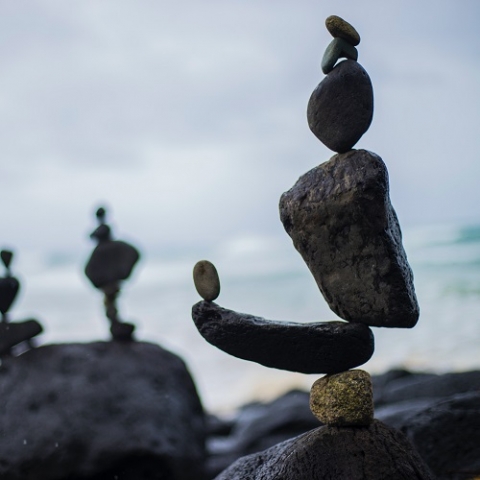Vestibular Rehabilitation
Vestibular rehabilitation (VR) consists of exercises to treat dizziness and balance problems. It may include Positional Manoeuvres for all types of BPPV.
Good balance is essential for daily life, from getting out of bed to crossing the road. A healthy balance system uses information from the brain, inner ears, eyes, and joints, and enables people to see clearly when moving their head.
Dizziness and balance issues can affect all age groups.
The prevalence of Dizziness and Balance disorders increases with age and these disorders are some of the most common complaints reported to GPs by older patients. Untreated, they result in worsening unsteadiness, loss of confidence and anxiety, difficulty with concentration and memory, inactivity, loss of independence, an increased risk of falls.
Common symptoms related to dizziness, vertigo and falls include the following:
❇️ Unsteadiness
❇️ Imbalance
❇️ Veering whilst walking
❇️ Dizziness in crowds
❇️ Spinning
❇️ Floating
❇️ Swaying
❇️ Feeling drunk
❇️ Headaches
❇️ Nausea
❇️ Jelly legs
What causes dizziness, balance and general unsteadiness and imbalance?
There are many reasons for dizziness and imbalance.
The most common form of dizziness and balance disorder is BPPV (Benign Paroxysmal Positional Vertigo), a disorder of the inner ear resulting in episodes of intense dizziness on certain head movements.
Other causes include:
❇️ side effects from medication or alcohol, brain disorders such as stroke, concussion or cerebellar degeneration, cardiac problems and anxiety.
❇️ Vestibular Migraine
❇️ Semi Circular Canal Dehiscence & Fistulas
❇️ Meniere’s Disease
❇️ Persistent postural-perceptual dizziness (PPPD)
❇️ Vestibulopathy
❇️ …… And many more
Please note that Jennifer-Ann does NOT conduct an ear examination, nor a hearing test – you will need to see an audiologist for these.
Symptoms requiring that you have first consulted with GP/ Medical practitioner/111 include:
🚩 Acute / recent or new onset of balance problems or headaches.
🚩 Severe nausea and vomiting
🚩 Ongoing symptoms that have not yet been investigated through your GP
🚩 Otherwise feeling unwell
🚩 Visual disturbance (double vision), facial weakness or numbness, loss of control of your arms or legs
🚩 Acute/sudden loss or change in your hearing
What is vestibular rehabilitation?
Dizziness and balance issues my persist long after the problem has passed or is no longer in its early/acute phases.
Jennifer-Ann is a highly experienced physiotherapist who specialises in providing rehabilitation and physical therapy for vestibular disorders.
Following thorough examination, specialist physiotherapists develop personalised exercise-based management plans including home exercise programmes.
Physiotherapists perform vestibular rehabilitation as they are ideally suited based on their training in restoring function, balance, and strength through exercise which targets the balance systems (ear, eyes, brain and the reflexes controlling whole body control).
Physiotherapists are ideally placed to provide early screening and intervention to minimise the impact on daily life of balance and dizziness disorders.
Who can benefit from vestibular rehabilitation?
People with inner ear (vestibular) and central (brain) disorders can be helped with VR.
VR is an exercise-based programme to encourage the central and peripheral nervous system to compensate for problems in the inner ear
Often these conditions have caused what is known as “multi-factorial balance and dizziness disorders” where you have learnt to adapt around the problem but this is now limiting your life choices.
Multifactorial dizziness is a condition where more than one of the senses is impaired, leading to a greater degree of dizziness or imbalance. It is caused by disorders of the senses and/or the brain, which can occur from a plethora of conditions and disorders. In older patients, dizziness is often multifactorial secondary to drug adverse effects and age-diminished visual, vestibular, and proprioceptive abilities. Conditions contributing to multifactorial balance and dizziness include poor vision, weak muscles, poor coordination, poor sensation, impaired proprioception, and medications.
The good news is that our systems like working together as a team. When one team member is struggling, the others can help, but only if they are encouraged and trained in how to do this. Such teamwork is known as “Vestibular Compensation”, and it is trained through VR.
What factors are related to recovery?
The degree to which people improve depends on their diagnosis, medication use or non-use, other health problems, motivation, family support plus other psychological factors. There is evidence that suggests that an individualised exercise programme is better than a generic exercise programme.
What can I expect from a vestibular physiotherapist?
Most therapists will start by asking you lots of questions to obtain a thorough history considering the initial onset and course of your condition. Then they evaluate eye and head movements, and screen for the presence of Benign Paroxysmal Positional Vertigo (BPPV). A comprehensive evaluation of standing and walking balance is then performed and any causes underpinning this.
Your individual goals and expectations of treatment can then be determined.
Based on the findings from the examination, a home exercise programme (HEP) is usually developed.
The length of time seen, and number of visits needed to improve can vary. Most of the improvement occurs due to the performance of the exercises at home (Home Exercise Programme). This is necessary to retrain the balance systems to work inharmony and as a team.
During follow-up visits, the physiotherapist may decide to update the HEP based on your symptoms and progress with the exercises. The frequency of visits can vary, and duration of VR can last from as little as 1 to 2 weeks to several months.
Blogs: Jennifer-Ann Gibbons, vestibular physiotherapist
In Conversation With… An interview with Jennifer-Ann Gibbons, Physiotherapist






